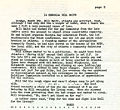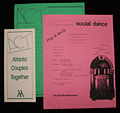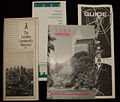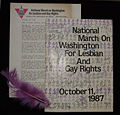AIDS and Politics - 1980 to 1989
The popularity of bars and parties did not wane in the 1980s, but the gay and social political landscape of Atlanta, as in other major cities, was transformed by the AIDS crisis. Though AIDS first came to national attention in 1981, in Atlanta, thanks in part to the presence of the Centers for Disease Control, gay activists began organizing around the issue as early as 1983. AID Atlanta, an all-volunteer educational and service organization, was among the first groups that formed. By the end of the decade, there existed a network of HIV/AIDS support and activism, including a local chapter of the AIDS Coalition to Unleash Power (ACT-UP) and programs and organizations to address women and communities of color.
Courtesy of the Kenan Research Center at the Atlanta History Center.
Courtesy of the Kenan Research Center at the Atlanta History Center.
Photograph, Atlanta Gay Center, circa 1980. Photographer unknown. Courtesy of the Kenan Research Center at the Atlanta History Center.
Flyer, First Tuesday, 1980. Courtesy of the Kenan Research Center at the Atlanta History Center.
Newsletter, AID Atlanta, 1983. Courtesy of the Kenan Research Center at the Atlanta History Center.
First issue, PULSE, 1984. Courtesy of the Kenan Research Center at the Atlanta History Center.
Courtesy of the Archives Division, Auburn Avenue Research Library on African American Culture and History.
Courtesy of the Archives Division, Auburn Avenue Research Library on African American Culture and History.
Much, though not all, activism during this decade centered on AIDS, and lesbians played an important role in the movement to educate people and to combat the increasingly vocal antigay forces from the Christian right and the Republican Party. All the while, evangelical ministers, among them Charles Stanley of the First Baptist Church of Atlanta, preached that HIV/AIDS was God's punishment for homosexuality. When Georgia native J. B. Stoner, a lifelong segregationist and white supremacist, led a mob confronting civil rights marchers in Forsyth County, Georgia, in 1987, he passed out leaflets that read "Praise God for AIDS" across the top. In the clip below, performers RuPaul and Wanda Peek document the march.
<youtube>hntVo25hOgo</youtube>
Printed materials related to Evangelical Outreach Ministries, 1985. Courtesy of the Archives Division, Auburn Avenue Research Library on African American Culture and History.
Printed materials related to Atlanta's gay ordinance, 1986. Courtesy of the Archives Division, Auburn Avenue Research Library on African American Culture and History.
Printed materials related to Atlanta Couples Together, 1986. Courtesy of the Archives Division, Auburn Avenue Research Library on African American Culture and History.
Photograph, Tower Lounge staff, circa 1988. Photographer unknown. Courtesy of the Kenan Research Center at the Atlanta History Center.
Photograph, Armorettes, circa 1983. Photographer unknown. Courtesy of the Kenan Research Center at the Atlanta History Center.
Advertisement featuring performer RuPaul, Weekends, 1984. Courtesy of the Kenan Research Center at the Atlanta History Center.
Newsletter, the Montgomery Foundation Gender Dysphoric Association, 1985. Courtesy of the Kenan Research Center at the Atlanta History Center.
Guides, 1986-1989. Courtesy of the Archives Division, Auburn Avenue Research Library on African American Culture and History.
During the same period, another event of national import occurred, when in 1982, Atlantan Michael Hardwick was arrested in his bedroom for engaging in oral sex with another man. Hardwick appealed, aided by the ACLU and Georgians Opposed to Archaic Laws, but in 1986 the case reached the U.S. Supreme Court, which upheld Georgia’s sodomy statute. In response to the Hardwick case, a strong belief that the U.S. government was failing to adequately address the AIDS crisis, and ongoing discrimination, LGBT Atlantans responded vocally and visibly in local marches and rallies, as well as the second national March on Washington for Lesbian and Gay Rights in 1987.
Cover, The News, 1985. Courtesy of the Kenan Research Center at the Atlanta History Center.
Printed materials related to the formation of an Atlanta committee for the National March on Washington, 1987. Courtesy of the Archives Division, Auburn Avenue Research Library on African American Culture and History.
Printed materials related to the National March on Washington, 1987. Courtesy of the Archives Division, Auburn Avenue Research Library on African American Culture and History.
Printed materials related to the Names Project in Atlanta, Georgia, 1988. Courtesy of the Archives Division, Auburn Avenue Research Library on African American Culture and History.
Photograph, James Heverly (left), Layton Gregory (center), and Fritz Rathmann, circa 1983. Heverley, along with Patrick Coleman and Jaye Evans, published the popular Etcetera magazine. Photographer unknown. Courtesy of the Kenan Research Center at the Atlanta History Center.
Printed materials related to LGBT support of Maynard Jackson's mayoral campaign, 1989. Courtesy of the Archives Division, Auburn Avenue Research Library on African American Culture and History.
Photograph, Atlanta River Expo participants, 1988. Photographer unknown. Courtesy of the Kenan Research Center at the Atlanta History Center.
Program, Miss Gay Atlanta Pageant, 1989. Courtesy of the Archives Division, Auburn Avenue Research Library on African American Culture and History.
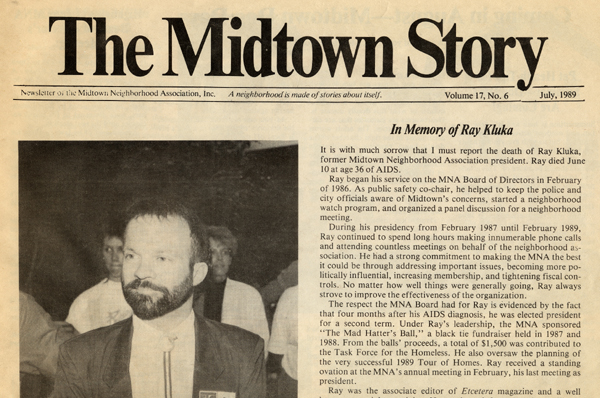
Cover,
The Midtown Story, 1989. Throughout the 1980s, the city's gay publications chronicled the devastation wrought by the AIDS crisis, including the death of Ray Kluka, a tireless champion of gay rights, in 1989. In 1979, Kluka served as the male co-chair of the Southeast region committee for the national March on Washington. Over the next several years, he held leadership positions with the Atlanta Gay Center, First Tuesday, and Midtown Neighborhood Association and served as an editor for
Etcetera. Courtesy of the Kenan Research Center at the Atlanta History Center.
Parties and Pride - 1970 to 1979
Collective Power and Culture Wars - 1990 to 1999
Atlanta Since Stonewall, 1969-2009: A Local History <comments />


